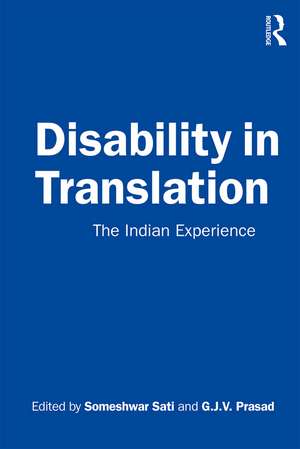Disability in Translation: The Indian Experience
Editat de Someshwar Sati, G.J.V. Prasaden Limba Engleză Paperback – 23 iul 2019
The essays in the volume reflect and theorise on experiences of translating various Indian-language stories (into English) which have disability as their subject. They focus on recovering and empowering marginal voices, as well as on the mechanics of translating idioms of disability. Furthermore, the book goes on to engage the reader to demonstrate how disability, and the space it occupies in our lives, can be reinforced or deconstructed in translation.
A major intervention in translation and disability studies, this volume will be of great interest to scholars and researchers of literature, culture, and sociology.
| Toate formatele și edițiile | Preț | Express |
|---|---|---|
| Paperback (1) | 369.73 lei 6-8 săpt. | |
| Taylor & Francis – 23 iul 2019 | 369.73 lei 6-8 săpt. | |
| Hardback (1) | 1000.27 lei 6-8 săpt. | |
| Taylor & Francis – 23 iul 2019 | 1000.27 lei 6-8 săpt. |
Preț: 369.73 lei
Nou
Puncte Express: 555
Preț estimativ în valută:
70.75€ • 75.65$ • 58.99£
70.75€ • 75.65$ • 58.99£
Carte tipărită la comandă
Livrare economică 17 aprilie-01 mai
Preluare comenzi: 021 569.72.76
Specificații
ISBN-13: 9780367333874
ISBN-10: 0367333872
Pagini: 278
Ilustrații: 7 Halftones, black and white; 7 Illustrations, black and white
Dimensiuni: 156 x 234 x 18 mm
Greutate: 0.45 kg
Ediția:1
Editura: Taylor & Francis
Colecția Routledge India
Locul publicării:Oxford, United Kingdom
ISBN-10: 0367333872
Pagini: 278
Ilustrații: 7 Halftones, black and white; 7 Illustrations, black and white
Dimensiuni: 156 x 234 x 18 mm
Greutate: 0.45 kg
Ediția:1
Editura: Taylor & Francis
Colecția Routledge India
Locul publicării:Oxford, United Kingdom
Public țintă
PostgraduateCuprins
List of figures. List of contributors. Acknowledgements. Introduction. 1. A different idiom: translation and disability. 2. Translation as social action: the counter-discourse on the literary representation of disability. 3. Gitopadesha on wheelchairs and crutches: an alternative aesthetic. 4. Disabling normalcy in ‘Thakara’: a comparative reading of P. Padmarajan’s short story and its film adaptation. 5. Disability, translation and curriculum: a case study of Rangeya Raghav’s ‘Goongey’. 6. Translation as ‘re-presentation’: the disability spectrum in selected Urdu short stories. 7. Translating desires of the undesired: re-reading Tagore’s different women in ‘Subha’ and ‘Drishtidaan’. 8. ‘Blind’ fate and the disabled genius: postcoloniality and ‘translation’ in Saurabh Kumar Chaliha’s ‘Beethoven’. 9. Fighting against multiple bodies! Translating ‘Nāri o Nāgini’ and ‘Tamoshā’ by Tarashankar Bandyopadhyay and ‘Bonjhi Gunjomālā’ by Jagadish Gupta. 10. Negotiating disability in/and translation: a reading of two Tamil short stories. 11. Reading interrupted: translating disability in ‘Subha’. 12. ‘Lohini Sagai’: translating disability, literature and culture. 13. Gendering disability in Dharamvir Bharti’s ‘Gulki Banno’: ‘The Hunchback Bride’. 14. The politics of translation: disability, language and the in-between. 15. ‘Viklang’: performing language and cripping modernity through translation. 16. Translating stigma in the postcolonial context: an analysis of Bharat Sasne’s short story ‘Mai Dukh Ki Lambi Raat’. 17. Translating rhetoricity and everyday experiences of disablement: the case of Rashid Jahan’s ‘Woh’. 18. Disability and the call for prayer: translating Khalid Jawed’s short story ‘Koobad’. Index.
Notă biografică
Someshwar Sati is Associate Professor at the Department of English, Kirori Mal College, University of Delhi, India. His research interests encompass Postcolonial Studies and the Indian English Novel, Disability Studies, and Translation Studies. Dr Sati has edited three critical volumes on postcolonial theory and literature, Warble of Postcolonial Voices, Volume I and II and Writing the Postcolonial: Poetics, Politics and Praxis.
G.J.V. Prasad is Professor of English at Jawaharlal Nehru University (JNU), India, and former Director of the Jawaharlal Nehru Institute of Advanced Study, JNU, India. His major research interests are Indian English Literature, Contemporary Theatre, Dalit Writings, Australian Literature, and Translation Theory. He has co-edited with Sara Rai a collection of stories from Indian languages, Imaging the Other. His academic publications include Continuities in Indian English Poetry: Nation Language Form, and Writing India, Writing English, along with five other edited volumes of critical essays, Vikram Seth: An Anthology of Recent Criticism, The Lost Temper: Essays on Look Back in Anger, Translation and Culture: Indian Perspectives, “Violets in a Crucible”: Translating the Orient (along with Madhu Benoit and Susan Blattes), and Indian English and Vernacular India (along with Makarand Paranjape). Professor Prasad is also a poet and a novelist, and has most notably received the Katha Award for translation from Tamil.
G.J.V. Prasad is Professor of English at Jawaharlal Nehru University (JNU), India, and former Director of the Jawaharlal Nehru Institute of Advanced Study, JNU, India. His major research interests are Indian English Literature, Contemporary Theatre, Dalit Writings, Australian Literature, and Translation Theory. He has co-edited with Sara Rai a collection of stories from Indian languages, Imaging the Other. His academic publications include Continuities in Indian English Poetry: Nation Language Form, and Writing India, Writing English, along with five other edited volumes of critical essays, Vikram Seth: An Anthology of Recent Criticism, The Lost Temper: Essays on Look Back in Anger, Translation and Culture: Indian Perspectives, “Violets in a Crucible”: Translating the Orient (along with Madhu Benoit and Susan Blattes), and Indian English and Vernacular India (along with Makarand Paranjape). Professor Prasad is also a poet and a novelist, and has most notably received the Katha Award for translation from Tamil.
Descriere
This volume explores how disability is seen, written about, read and understood through literature and translation. Foregrounding the asymmetrical world of power relations, it delves into the act of translation to exhibit how disability is constructed and deployed in language and culture.
